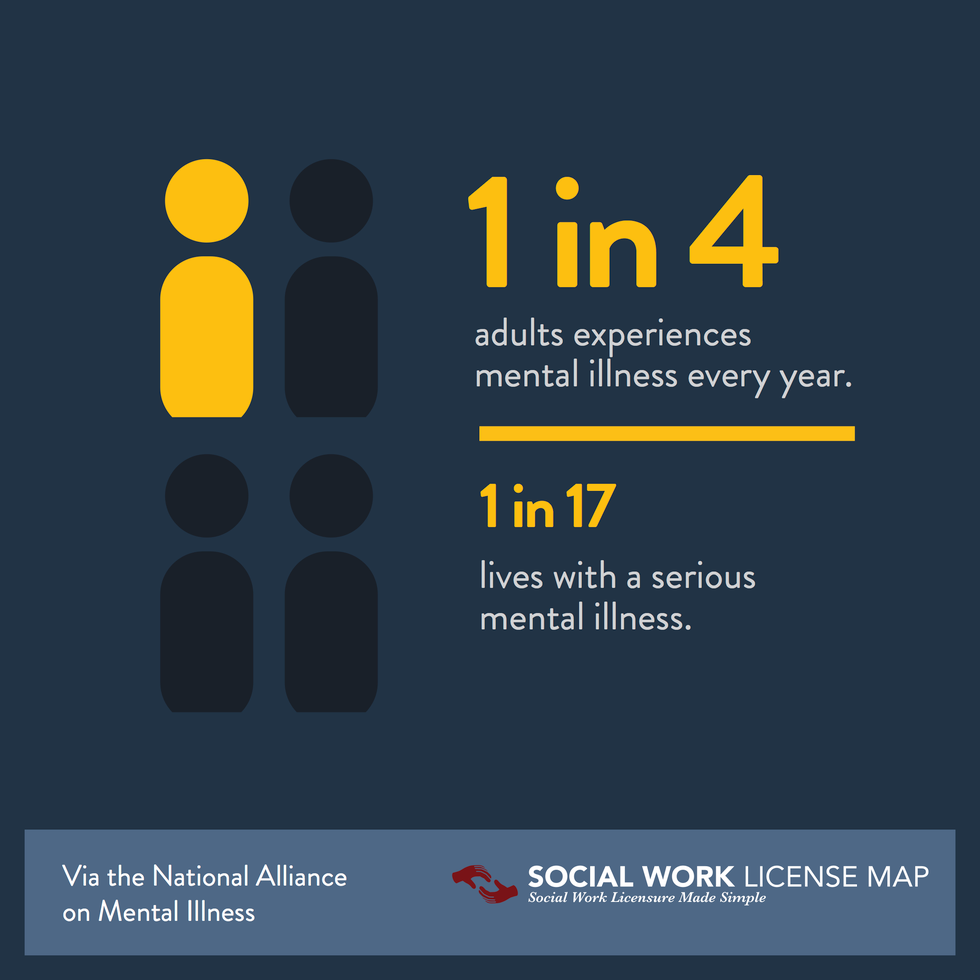May is Mental Health Awareness Month.
Mental health is an issue that affects individuals of every age, every race, every class, etc. It is an issue that does not only affect those who suffer; it affects those around them as well. The taboo associated with mental illness cause it to be misunderstood by the general public. Take this opportunity to learn a bit more about mental health and mental illnesses, because chances are, it's made an impact on you.
Basic Definitions
Mental Health: a state of well-being in which the individual realizes his or her own abilities, can cope with the normal stresses of life, can work productively and fruitfully, and is able to make a contribution to his or her community.
Mental Illness: health conditions that are characterized by alterations in thinking, mood, or behavior (or some combination thereof) associated with distress and/or impaired functioning.
Serious Mental Illness: A mental, behavioral, or emotional disorder (excluding developmental and substance use disorders) that is diagnosable currently or within the past year, of sufficient duration to meet diagnostic criteria specified within the Diagnostic and Statistical Manual of Mental Disorders (DSM-IV), and results in serious functional impairment, which substantially interferes with or limits one or more major life activities.
Co-Occurring / Co-morbid: The existence of two or more illnesses – whether physical or mental – at the same time in a single individual. When SAMHSA uses this term, it usually means the coexistence of mental illness and substance abuse.
Psychiatrist:Licensed physicians who specialize in the evaluation, diagnosis, and treatment of mental disorders that can prescribe medication.
Psychologist:A specialist in the study of the structure and function of the brain and related behaviors or mental processes that can provide psychological evaluation, assessment, testing, and treatment, but cannot prescribe medication.
DSM: The Diagnostic and Statistical Manual of Mental Disorders
NAMI: National Alliance on Mental Illness
Stigma: A mark of shame or discredit. A sign of social unacceptability.
SAMHSA: Substance Abuse and Mental Health Services Administration
Therapy: Treatment of physical, mental or behavioral problems that is meant to cure or rehabilitate.
Psychotherapy: Therapy that emphasizes substituting desirable responses and behavior patterns for undesirable ones.
NIMH:National Institute on Mental Health
Common Mental Illnesses Defined
Depressive Disorders: Depressive disorders cause severe symptoms that affect how you feel, think, and handle daily activities, such as sleeping, eating, or working. To be diagnosed, the symptoms must be present for at least two weeks. All disorders feature an abnormally depressed mood.
Anxiety Disorders: Anxiety disorders are a group of related conditions, each with unique symptoms that produce persistent, excessive fear or worry in situations that are not threatening.
Mental Health Statistics
+One in four American adults suffer from mental illness.
+One in 17 American adults live with a serious mental illness.
+Approximately 20 percent of state prisoners have “a recent history” of a mental health condition. 21 percent of local jail prisoners have the same.
+Students in special education have the highest drop-out rate of any disability group with a rate of over 50 percent.
+Suicide is the tenth leading cause of death for adults in the U.S. and the third leading cause of death for ages 15 to 24 years.
+Over 90 percent of suicides are committed by an individual with one or more mental disorders.
+20 percent of suicides are completed by U.S. veterans (U.S. veterans make up less than one percent of the population.
+70 percent of youth in juvenile justice systems suffer from at least one mental health condition. At least 20 percent live with a severe mental illness.
+Only 41 percent of American adults with mental illnesses received treatment in the last year.
+Adults in the U.S. living with serious mental illness die (on average) 25 years earlier than others.
How to Get Help
Are you concerned about the state of your mental health? Utilize these screening tools for more information.
Learn more about when and where to get help.
Get help finding a mental health professional.
Learn more about staying mentally healthy.











































